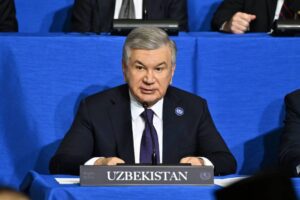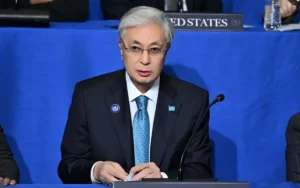Factsheet on ethnic and religious relations in Kazakhstan

Factsheet on ethnic and religious relations in Kazakhstan and the role of the Assembly of the People of Kazakhstan
In the over 30 years since Kazakhstan’s independence, the country has worked diligently to build an inclusive society which promotes ethnic dialogue and harmony. The Assembly of the People of Kazakhstan plays an important role in this.
This is celebrated annually on May 1, when the country marks the Day of Unity of the People of Kazakhstan.
The policy is being maintained and developed by the country’s President, Kassym-Jomart Tokayev, and Kazakhstan’s government.
Kazakhstan’s ethnic and religious demography of Kazakhstan
- Kazakhstan’s multicultural society is made up of approximately 19 million people, representing over 100 ethnic groups and 18 religious denominations. Importantly, all ethnic groups hold a single civil and social status in Kazakhstan.
- There are over 3,000 religious organisations in Kazakhstan, which all operate free from government interference.
- Kazakhstan’s latest census (2021) showed that the ethnic structure of Kazakh society is approximately 70% Kazakh and 16% Russian. Other groups include Ukrainians, Uzbeks, Germans, Tatars, Chechens, Ingush, Uyghurs, Koreans and Turks.
- Though the country’s largest religious grouping is in Islam, followers of all faiths and none live in harmony with each other, safeguarded by the Constitution of Kazakhstan which guarantees the right and freedom to choose one’s own religion or belief of any kind.
Ethnic and religious unity of Kazakhstan
- Kazakhstan has worked diligently over the past three decades to build an inclusive society which promotes interfaith dialogue and religious harmony – a feat recognised and welcomed by international organisations including the United Nations, UNESCO, the World Islamic League and the Organisation of Islamic Cooperation.
- During the session of the Assembly of the People of Kazakhstan in 2022, President Kassym-Jomart Tokayev emphasised that it is of fundamental importance that representatives of all ethnic groups living in Kazakhstan share common civic values and associate themselves with the country. He added that “this is our great achievement over the years of independence, and we are obliged to comprehensively strengthen it.”
- In recent years, several significant projects have been implemented in Kazakhstan, including regarding the recommendations of the OSCE High Commissioner, aimed at further consolidating the Kazakh society, strengthening institutions of inter-ethnic and interfaith harmony, building an effective system of interaction between government bodies and ethnic and cultural associations, as well as improving the education system in the languages of various ethnic groups of Kazakhstan.
Background information about the Assembly of People of Kazakhstan
- The Assembly of People of Kazakhstan (APK), established in 1995, plays an important role in the formation of a unique model of social unity. It is a unique civil society organization that unites representatives of 100 ethnic groups.
- The main purpose of the Assembly is to implement national policy, ensure socio-political stability in Kazakhstan and increase the effectiveness of cooperation between state institutions and civil society in the field of interethnic relations.
- President Tokayev noted at last year’s session of the Assembly of People of Kazakhstan that the undoubted merit of the Assembly is that over the years of its existence it has contributed to strengthening civil unity. He added that he was confident that the Assembly would continue to serve as a solid institutional policy of peace and harmony.
The People’s Assembly has also established official ties with the OSCE High Commissioner for National Minorities, the Center for Global Dialogue and Cooperation, state and non-State structures of many countries.
Objectives and contribution of the Assembly
- Since its establishment, the Assembly has contributed to the creation of a unique model of interethnic and interreligious harmony in Kazakhstan, with an atmosphere of trust, solidarity and mutual understanding, where every citizen, regardless of his ethnicity or religion, enjoys all civil rights and freedoms guaranteed by the Constitution.
- The Assembly promotes the creation of favorable conditions for the further strengthening of interethnic harmony, tolerance and unity.
- In addition, it helps the Government in the fight against extremism and radicalism, as well as in the formation of a political and legal culture of citizens based on democratic standards.
- The Assembly promotes the efforts of various ethno-cultural associations, helps to revive, preserve and develop the culture, language and traditions of various ethnic groups of Kazakhstan.
- The Assembly of People of Kazakhstan was established by the Decree of the Head of State on March 1, 1995. The Assembly consists of 583 people.
- The supreme body of the Assembly is the session, which is held annually under the chairmanship of the President of the country. All its decisions are mandatory for consideration by state bodies.
- The Assembly Council works between sessions, which includes representatives of republican ethno-cultural associations (hereinafter referred to as ECA), public figures, members of Parliament, ministers, akims (governors of regions) of regions. The composition of the Assembly Council is 84 people.
- Since 2022, the APK has been represented in the supreme legislative body – the Senate of the Parliament of the Republic of Kazakhstan. By the Decree of the Head of State, 5 deputies were appointed on the recommendation of the APK.
- Today there are more than 1000 ethno-cultural associations operating in the republic, including 14 republican ones.
- Branches of the national public association “Assembly of Zhastars” (youth of the Assembly) operate in 17 regions of the country. The asset of the NGO “Assembly of Zhastary” is more than 8000 young people. In 2022, the youth of the APK held more than 2 thousand events with the participation of 200 thousand people.
- 40 Friendship Houses – multifunctional resource centers of the Assembly. The Republican House of Friendship operates in Almaty.
- The Scientific and Expert Council of the APK was established in 2009 on behalf of the Head of State to provide scientific and analytical support for the activities of the APK. It consists of 58 scientists, 35 of them are doctors of sciences, 12 are candidates of sciences, as well as heads of research institutes and public figures.
- 1,072 Aksakaldar kenesi operate in the regions under the auspices of the Assembly (Council of Wise Men) (7,145 members) and 1,712 Councils of Mothers (14,148 members) at the regional, city, district and rural levels, as well as in the collectives of large enterprises. They actively participate in solving urgent problems of the population on the ground, work in the field of prevention of any conflict.
- One of the directions of the APK’s work is to promote the development of the institute of mediation in the field of public consent and national unity. The mediation network of the Assembly includes 1 republican and 19 regional councils, as well as 19 at Friendship Houses, 443 dialogue platforms have been opened under the auspices of the APK. The number of ANC mediators is 1,222 people.
- The Assembly promotes the development of charity in the country, provides coordinating and other support. The total amount of assistance from ethno-cultural associations, benefactors of the APK in 2022 amounted to more than 760 million tenge. Assistance of various kinds has been provided to more than 151 thousand citizens.
Regular session of the Assembly of People of Kazakhstan
- The 32nd session of the Assembly of People of Kazakhstan will be held on April 26-27, 2023 at the Palace of Peace and Accord in Astana.
- The theme of the upcoming session is “Fair Kazakhstan: unity, stability, development”.


